The Vunipola boys were never meant to become rugby players. Their father, Fe’ao, played the game all his young life, as his father and grandfather had before him. But Fe’ao and his wife, Singa, wanted Mako and Billy to become professionals, “doctors, lawyers, teachers, anything which would last”. Rugby, Fe’ao says, “is a hard life and a short one”. He recalls one night in Pontypool when he was brooding on just how hard and short it can be. He had been to training thinking he would be playing that weekend but was told he had been dropped from the squad. Which meant no match fee and no win bonus, so no money that week. He went home, and when he walked in he found his two boys in front of the TV, wrestling with each other on the rug. “Mako was on top of Billy, squeezing his neck.”
They were supposed to be studying. “We had this timetable. After school the boys come home, do chores, play or watch TV, shower, tea, then homework for two hours, then bed. Every night.” Fe’ao stood over them. “I told you to focus on your study, and here you are,” he said. “Playing when you are supposed to be doing your homework.” He told them to get changed. “We are going training.” Outside a storm was blowing and freezing sleet was falling on the icy streets. “The boys cried: ‘Oh no!’ and even Singa tried to stop me. But I said: ‘No, they have to focus, if they want to play this is what they have to do.’” Five minutes later they were all out the door.
“I’ll never forget it, it was snowing, and it was so cold, and I thought: ‘What have I done?’”
There was a small church at the end of their road, and beyond it a large hill. “How many, Dad?” Mako asked. “You do 10, I will do 20.” So they started running up and down, pausing to rest in the lee of a big fence between each circuit. When it was over, Fe’ao pulled the boys in close and said: “‘If you want to be a professional, this is what life will be like. It will be hard. Harder than this.’ And I thought: ‘This will stop them from deciding to play rugby.’” He smiles. Singa cuts in: “And from that day onwards they were determined to play rugby.” Fe’ao laughs. “After that they changed. They became more focused on both their studies and their rugby.”
He never tried to discourage them again.
Years later, Billy, 24, is England’s vice-captain and a man, says Eddie Jones, “who can become the best No8 in the world”. His elder brother, Mako, 25, has finally become England’s first-choice loosehead prop after four years on the substitutes’ bench. His form this season has been so good that he too has now been singled out as one of the world’s very best players in his position. So the foundations of England’s pack were laid down by one Tongan family, who only moved to Great Britain in 1999. Their story is a timely reminder of the contribution migrants make to this country. “More than anything,” Singa says, “we are so happy that they have given England something to be proud of, because England has been so good to them.”
Fe’ao’s father, Sione, used to dream that one of his grandchildren would play for England. He persuaded the family to move here when the agent Phil Kingsley Jones offered to help fix Fe’ao a two‑year contract at Pontypool.
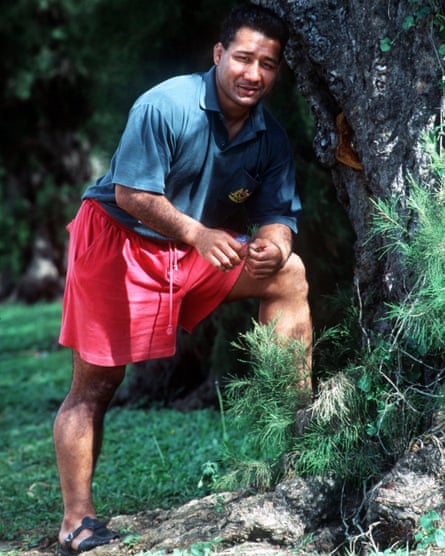
“In Tonga our perception of the United Kingdom is that it is a land of milk and honey,” says Singa. “When you get to Great Britain, you get to the world.”
“My father Sione was very old‑fashioned,” Fe’ao says. “He looked at Great Britain as the best.”
Many Tongans move to New Zealand or Australia, and the Vunipolas spent time living, working and studying in both countries – with Mako born in Wellington and Billy in Sydney. “But he still thought of them as colonies,” Fe’ao explains. “And he said why go to the colony when you could go to the superpower?”
In Pontypool, Fe’ao lived in a small flat that had no central heating. He used to sleep in his trousers and coat. It didn’t matter. “For me, it was the first place I had been, so it was the best place I had been. It was my dream.”
Singa was still back in Tonga with the children. She was working at the customs office and thinking of entering the church. But Sione persuaded her that the family should travel over to live with Fe’ao. When his contract was over, they all came home again. And Sione called his son a coward for quitting the UK. “He said: ‘I want you to take your family to Britain,’” Singa remembers,“‘and don’t come back here until you are citizens.’” So Fe’ao signed another contract, this time with Pontypridd.
In Wales, the Vunipolas built a life around two poles, the rugby club and the church. “I think it could be different if we weren’t involved with rugby,” says Fe’ao. “Being a rugby player people approach you and accept you more easily.” There was an expectation that because Fe’ao played rugby, Mako and Billy would do, too. They had the build for it. Always had done.
Mako was a 12lb baby, Billy a little lighter but taller, longer-limbed. “I will never forget the day I took them shopping for school uniforms,” Singa says. “The lady at the school store said: ‘How old are they?’ and I said: ‘One is six and one is eight.’ And she went to pick up the six and the eight sizes.” When the sales assistant brought over the clothes Singa said “sorry” and sent her away again. She ended up buying two teenage sets and shortening the sleeves and legs.
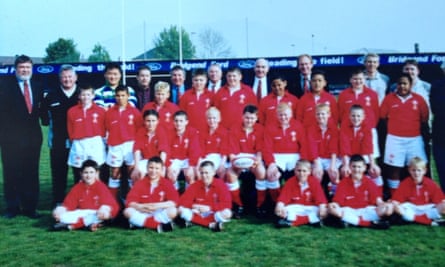
The boys had the build but not the natural talent. During his first match Billy just stood in the middle of the field watching the ball while it whizzed around him. “I stood on the side shouting: ‘Catch the ball, Billy! Catch the ball!’” He soon improved.
“We had no toys for them,” says Fe’ao. “The rugby ball was their only toy. So that’s all they would play with. I had to stop them from playing rugby inside the house.”
By the time the family moved to Bristol so that Singa could work as a minister the boys were so devoted to the game that the first thing they wanted to do was go to the local rugby club.
It was pre-season and there was only one player there, practising his kicks. He told them to come back another time. But instead Billy and Mako spent the afternoon catching the ball and fetching it back.
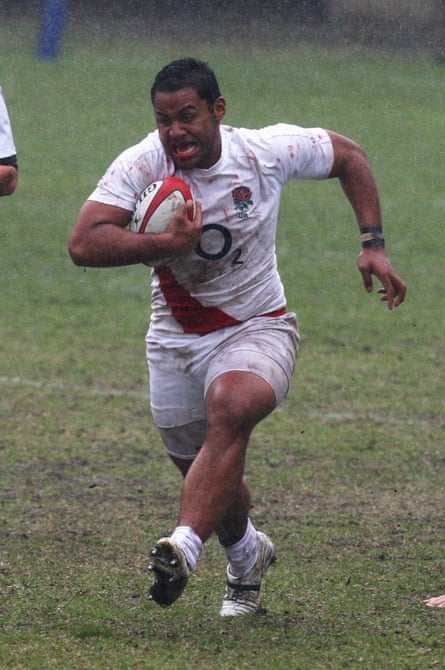
In Bristol the boys played for Castle school. Mako’s performances there earned him an invitation to apply for a scholarship at Millfield. Their director of rugby, John Mallett, remembers Mako as “a bundle of talent”. He was big, but “very little of what he did was about his size. He wanted to sidestep, he wanted to run, he wanted to kick the ball.” His party trick, Mallett says, was to kick drop goals while blindfolded by a coat draped over his head. “Mako was hugely competitive,” he says, “but the biggest thing he gave was his sense of fun, the enjoyment he took in what he was doing.” It took Mako two months to settle in, Mallett says, but once he did he became a “pied piper” for the other kids. “He was just a great kid to have around, because of his energy and sense of humour.” Mako repaid his debt to the school by paying for his younger sister to study there.
Billy ended up on a bursary at Harrow. He wanted to go to Millfield, too, but Fe’ao and Singa thought he needed to get out from his brother’s shadow.
When he talks about Billy, Harrow’s head of rugby, Jesse Coulson, sounds similar to Mallett. “People talk a lot about Billy’s size but actually that’s a tiny element of the player that he is. He has fantastic skills, a good pass, good vision, great feet, and he’s a thinker of the game,” Coulson says. “Rather than looking for contact, which many larger boys do at schoolboy level, he would always be the one who wanted to get the ball into space, and because of his vision, and his ability to read the game, he sort of stayed out of the contact area.”
Coulson isn’t surprised that Jones chose Billy to be one of his England vice-captains. At first Billy was a like “a little boy in an adult’s body” but he grew to be a leader in the team. “He isn’t the most vocal, he is not one of those players that will shout from the rooftops, but he is a player people will rally around. They see what he does on the field and they want to follow him. Billy is one of those people who will say the right thing at the right time, and then he will go out on the field and do it.” He remembers taking a team of forwards down to Richmond to play in the Surrey sevens. “Billy took all of our conversions and he just couldn’t miss. It didn’t matter where it was from, he was slotting them from the corners. And after each one he would just look at me and smile quietly, in his very humble way. And then he would just crack on with his job.”
During their first few years in the professional game, the brothers were on separate paths, Mako at Saracens, Billy at Wasps. It was Singa who brought them together again. She couldn’t stand to watch them play against each other and, worse, was worried that the competition between the teams would drive the family apart. It broke Billy’s heart to leave Wasps. But now they all agree it was the best decision.
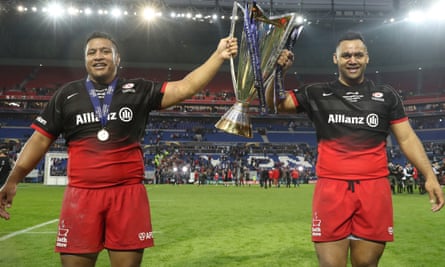
“They’ve grown at Saracens,” says Fe’ao, “not just as rugby players, but as men.” Grown in the figurative sense, that is. A lot of Mako’s recent improvement is down to the fact he has learned to watch his weight. He has had to plead with Singa to stop cooking home meals for them every time they come around to say hello. “He always worries he will disappoint me if he doesn’t eat what I provide,” she laughs, “so now he just asks me not to cook at all.”
Fe’ao wanted the boys to play for Wales. But they chose England. And now he says he gets emotional when he sees them sing the national anthem before their matches.
“Sometimes I wish my late father was still alive to see it,” he says, “and I try hard not to cry.”
He and Singa reel off a list of all the people they wish to thank, from their first days at Pontypool, through school, club, and junior rugby, all the men and women who helped Billy and Mako realise the dream their grandfather had.
“After all the help the boys have had,” Singa says, “we are just so proud of the fact that they are doing something good for themselves and their country. And they do think of England as their country, regardless of what anyone else thinks.” For them, she says, Britain still feels like the land of milk and honey.
The picture caption of the East Wales schools lineup was amended on 16 November 2016 to correct the location of Billy Vunipola and change “Toby Faletau” to Taulupe Faletau
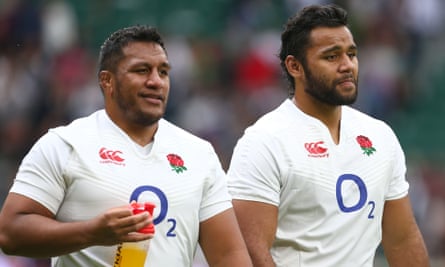
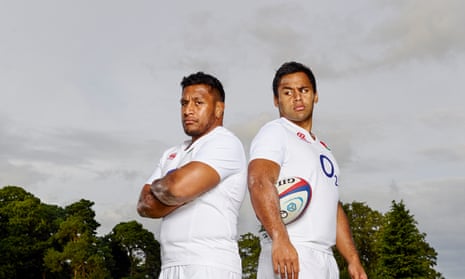
Comments (…)
Sign in or create your Guardian account to join the discussion